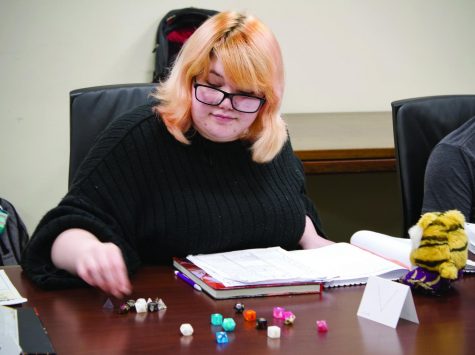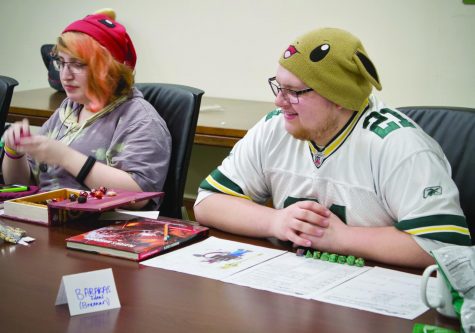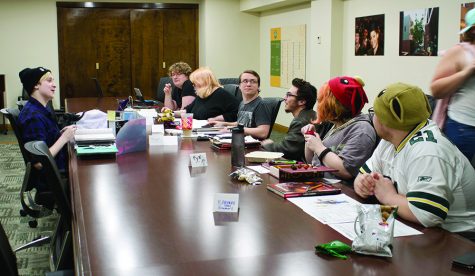Tables turn on table-top role-playing games
April 16, 2019

Schinel Koch plays Dungeons and Dragons last Monday.
When Sam Brooks, a 27 -year-old Inventory Manager from Mars, Pennsylvania, first wanted to play Dungeons and Dragons, he had to convince his step-mother that it wouldn’t make him a satanist or a serial killer.
“My step-mother was operating under the old impression that D&D brought kids to worship the devil,” Brooks said. “She eventually did some research for herself and realized that wasn’t true and I was allowed to play.”
Dungeons and Dragons is what is known in the board game community as a Table Top Role Playing Game (TTRPG). Every player creates a character and then roleplays as said character in an adventure designed by the Dungeon Master (DM). First published in 1974 by Tactical Studies Rules, Dungeons and Dragons garnered lots of attention during a period of time in the 1980’s known as the “Satanic Panic.” Many religious organizations claimed that the game encouraged sorcery, worshipped demons and was used as a recruitment tool for real like satanic cults.
Despite its torrid history, Dungeons and Dragons and the playing of other TTRPGs has become an incredibly popular hobby. Google Trends, a Google app that can track how often a term has been searched and when, displayed that even over the past few years, interest in TTRPGs and D&D (An abbreviation for Dungeons and Dragons) has skyrocketed. This can be displayed by the rise in numbers of TTRPG related businesses, Google searches (As presented in the graphics presented) and statistics provided by Roll20, an app used to play TTRPGs online that now represents a projected 60% of the game’s player base. In the last year, virtual games of Dungeons and Dragons went up 52%, which is more than the increase two years before, which was 27%.
In addition, it has sparked an entire company, “Wizards of the Coast,” who write extra content for the game and are also responsible for public games held in game stores across the country that anyone can join. But, for the most part, games are played between small groups of friends across the world.

So, why is the old game quickly gaining popularity? According to Jonas Prida, assistant provost and 20-year Dungeons and Dragons player, D&D and other TTRPGs have always offered inclusivity on a level seldom seen in other games.
“In the days before the internet, it was where you could hang out with fellow nerds. No one really cared if you had a retainer or watched Monty Python, as long as Grondor the Mighty showed up every weekend with his axe,” Prida said. He added that unlike most other board or video games, Dungeons and Dragons and other TTRPGs weren’t played competitively, but collaboratively.
“TTRPGs also aren’t competitive in the same way as other gaming events,” Prida said. “One reason I enjoyed playing was that we had to work together to overcome the Tomb of Horrors, instead of working against each other.”
To Brooks, more diverse and applicable media forms give TTRPGs more of a stage to be introduced to complete strangers to the hobby.
“Quite a few famous people have said they love playing TTRPGs. Vin Diesel has talked a decent bit about loving it […] To further this point, with the rise of popularity in video streaming services there has, for the last few years, been a rise in streaming [of TTRPGs],” Brooks said. “The most popular I can think of is the Critical Role series which averages 35,000 viewers while they are live and generally gets a couple 100,000 when they then post those streams to YouTube.”
While Brooks and Prida have been playing for a longer period of time, new players are joining. Point Park student and journalism major Mitchell Drake, who gathers with his friends several nights a week in a vacant classroom to play, notes why he and his friends were drawn to the game only recently.
“I think that games like D&D are popular with younger people because they are solely based on uncensored hypotheticals,” Drake said. “It hits the sweet spot of creativity and endless possibility that only few other experiences can match.”
While generally agreed upon that the process of playing a TTRPG is unique, many of those interviewed also agree that it can be socially and academically beneficial for those who take part, such as Chris Sichi, a full-time Technician at the Center for Media Innovation at Point Park. He has been playing board games, especially Magic the Gathering, for eight years, and argues that in a day that is dominated by the screen, TTRPGs and other tabletop games offer a much needed respite from digital communication.
“Technology has created a social and experiential disconnect for a lot of people,” Sichi said. “We spend a lot of our time engrossed in our devices. For me, when I’m playing Magic or any other tabletop game, nothing outside that table and those friends really matters.” In Brooks’s Dungeons and Dragons group, every single member has a full-time job.

In Brooks’s opinion, his participation at Dungeons and Dragons has helped him professionally.
“It helps me maintain a social life as I and my friends progress into adulthood and continue to gain responsibilities and obligations. It keeps my mind active and creative,” Brooks said “I would also argue that it has actually helped me in my professional career in the areas of problem solving and working in a group with others.”
The same can be said for Max McAuley, who, instead of playing the game as a character, is a DM for his Dungeons and Dragons group with Drake. This means that he designs and moderates the adventures that his group goes on. He has also noticed the game acting as a great facilitator for creative thought.
“They try to break my plans at every chance they get,” McAuley said. “It’s fun though. It keeps me thinking on my toes.” McAuley welcomes this new age of TTRPGs, complete with streaming, a larger audience and more accessible materials.
Sichi, while not only acknowledging that the business has been growing previously, expects it to grow well into the future.
“I think it’s going to continue to grow,” Sichi said. “More and more people will realize that playing board games isn’t what’s portrayed in stereotypes from 20 years ago.”
Prida, who played such games 20 years before, was thrilled to see such a renaissance.
“It pleases me to no end that TTRPGs came back,” Prida said. “As much as I like computer screens and video games, there is something to be said for sitting around the table, drinking a bunch of Mountain Dew, pulling out a bag of dice and erasing your character’s ability scores because of an unfortunate encounter with a mummy.”
And lastly, Brooks could not be more thrilled with how the public is responding to TTPRGs, and shared how they’ve affected him personally.
“Playing D&D and other TTRPGs has utterly changed my life for the better, and at the same time almost completely consumed it,” Brooks said.



















Kim Hackbarth • Apr 23, 2019 at 9:08 PM
A very well written article that was also informative. Great job.